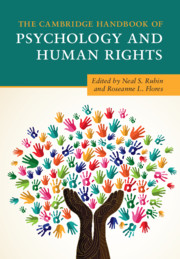Book contents
- The Cambridge Handbook of Psychology and Human Rights
- The Cambridge Handbook of Psychology and Human Rights
- Copyright page
- Dedication
- Contents
- Figures
- Tables
- Boxes
- Contributors
- Acknowledgments
- The Core International Human Rights Instruments and Their Monitoring Bodies
- Universal Human Rights Instruments
- Sustainable Development Goals
- Glossary of United Nations and Psychology Acronyms in the Handbook
- Introduction
- Part I History of Human Rights
- Part II The Intersection of Psychology and Human Rights
- Part III Contemporary Issues in Psychology and Human Rights
- Part IV Teaching, Research, and Training in Psychology and Human Rights
- 31 Decolonization and Liberation Psychology
- 32 Education of Psychologists for Human Rights Awareness, Accountability, and Action
- 33 Conducting Psychological Research across Borders
- 34 Diversity in Psychology Education and Training
- 35 Preparing Future Generations
- Part V Future Directions
- Index
- References
34 - Diversity in Psychology Education and Training
A Human Rights Imperative for a Globally Inclusive Psychology
from Part IV - Teaching, Research, and Training in Psychology and Human Rights
Published online by Cambridge University Press: 02 October 2020
- The Cambridge Handbook of Psychology and Human Rights
- The Cambridge Handbook of Psychology and Human Rights
- Copyright page
- Dedication
- Contents
- Figures
- Tables
- Boxes
- Contributors
- Acknowledgments
- The Core International Human Rights Instruments and Their Monitoring Bodies
- Universal Human Rights Instruments
- Sustainable Development Goals
- Glossary of United Nations and Psychology Acronyms in the Handbook
- Introduction
- Part I History of Human Rights
- Part II The Intersection of Psychology and Human Rights
- Part III Contemporary Issues in Psychology and Human Rights
- Part IV Teaching, Research, and Training in Psychology and Human Rights
- 31 Decolonization and Liberation Psychology
- 32 Education of Psychologists for Human Rights Awareness, Accountability, and Action
- 33 Conducting Psychological Research across Borders
- 34 Diversity in Psychology Education and Training
- 35 Preparing Future Generations
- Part V Future Directions
- Index
- References
Summary
In this chapter, we provide a brief overview of the role of human rights in psychology education and training, particularly as it violates cultural and human rights. We believe the current conceptual framework for diversity training in psychology perpetuates an acontextual, ahistorical, and acultural paradigm. Based on the literature and historical background, we discuss the implications of the ongoing Euro-American domination of the field and present examples of integrating diversity and human rights education from a more inclusive perspective. We end the chapter with some recommendations for a more integrated psychology discipline that is grounded in human rights and social justice.
- Type
- Chapter
- Information
- The Cambridge Handbook of Psychology and Human Rights , pp. 504 - 519Publisher: Cambridge University PressPrint publication year: 2020



